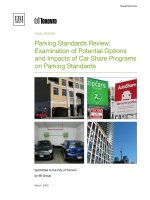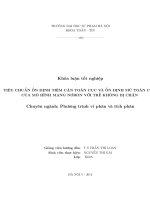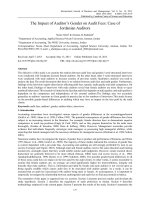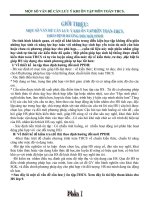WEPs Signers Can Now Share Progress on Gender Equality through the UN Global Compact’s Communication on Progress
Bạn đang xem bản rút gọn của tài liệu. Xem và tải ngay bản đầy đủ của tài liệu tại đây (748.33 KB, 13 trang )
COP Self-Assessment
Guidance for Companies
Introducing questions on gender into the COP Self-Assessment
Women‘s Empowerment Principles and UN Global Compact Reporting Team
Agenda
1. United Nations Global Compact and Women’s Empowerment Principles (WEPs)
2. WEPs and Reporting
3. Communication on Progress (COP)
4. Questions on Gender
5. Next Steps for Companies
6. Questions and Answers
Q&A
Technical Difficulties: If you have technical issues,
please let us know by typing a message in the
Questions pane (A). You can raise your hand (B) if
we do not respond.
Q&A: We will be taking questions on content at the
end, but you can send them to us throughout the
webinar by using the Questions pane (A). Please
specify to whom the question should be directed.
Example: Question for John Doe: What is the COP?
B
A
OVERVIEW
The United Nations Global Compact & WEPs
The UN Global Compact is the world’s largest
voluntary corporate sustainability initiative
offering guidance to business on how to align
their operations and strategies with ten
universally accepted principles in the areas of
human rights, labour, environment and anticorruption.
The Women’s Empowerment Principles, a joint
initiative of UN Global Compact and UN Women, offer
guidance to business on how to empower women in
the workplace, marketplace and community. The
WEPs seek to point the way to best practice by
elaborating the gender dimension of corporate
responsibility, the UN Global Compact, and business’
role in sustainable development.
OVERVIEW
Accountability and Transparency
Benefits
• Track improvement against
commitments
Principle 7 of the
WEPs underscores
the importance of
measuring and
reporting
• Identify gaps in existing programmes
and policies
• Benchmark performance against
competitors
• Identify high impact for further
replication
• Demonstrate progress to key
stakeholders
• Gain recognition for good practice
• Increase trust in your business
WEPs and the COP
All UN Global Compact participants commit to issuing an annual
Communication on Progress (COP), a public disclosure to stakeholders on
progress made in implementing the ten UN Global Compact Principles, and
broader UN development goals.
The COP now provides an opportunity for all UN Global Compact
participants that have signed the CEO Statement of Support for the
WEPs to report on WEPs implementation through the COP Self
Assessment with the integration of 4 gender-specific questions
COP Self- Assessment:
Questions on Gender
The COP describes policies and practices related to supporting women’s empowerment and
advancing gender equality in the workplace
The COP describes policies and practices related to supporting women’s empowerment and
advancing gender equality in the marketplace
The COP describes policies and practices related to supporting women’s empowerment and
advancing gender equality in the community
The COP contains or refers to sex-disaggregated data
COP Self- Assessment:
Questions on Gender
COP Self- Assessment:
Questions on Gender
Each question allows the company to add any other practices
they implement and to indicate their plans for the next COP cycle.
Other established or emerging best practices
[Specify in under 255 characters, including spaces. Alternatively, indicate if your
COP does not address this but explains the reason for omission (e.g., topic
deemed immaterial, legal prohibitions, privacy, competitive advantage).]
Any relevant policies, procedures, and activities that the company plans to
undertake by its next COP to address this area, including goals, timelines, metrics,
and responsible staff
OVERVIEW
Gender Equality Reporting Trends
Manual Review of 185 COPs
submitted by WEPs companies
88%
51%
Community
Workplace policies, practices and initiatives
•
Women on boards and in senior management
•
Inclusion and non-discrimination policies and
training
•
Women in middle management
Least Commonly Reported:
28%
Workplace
Most Commonly Reported:
Marketplace
•
Percentage of suppliers that are women-owned
•
Gender specific impact assessments for
community engagement
•
Strategy to ensure environmental, social and
governance projects have the full participation
of women and girls
Next Steps
Next steps for Companies:
• Complete your annual COP, including the submission with the
additional gender questions
• Inform the WEPs team or your Local Network representatives of
any problems
• Share your feedback on the new questions so we can continue
to improve our tools for gender-specific reporting
• Help us spread the word of this update to peer companies
Q&A
Technical Difficulties: If you have technical issues,
please let us know by typing a message in the
Questions pane (A). You can raise your hand (B) if
we do not respond.
Q&A: We will be taking questions on content at the
end, but you can send them to us throughout the
webinar by using the Questions pane (A). Please
specify to whom the question should be directed.
Example: Question for John Doe: What is the COP?
B
A
Thank You
Thank You or Joining Us
The presentation and recording of this webinar
will be available on the WEPs website:
www.WEPrinciples.org
For further questions please contact:
or
www.WEPrinciples.org
@WEPrinciples
facebook.com/WEPrinciples









